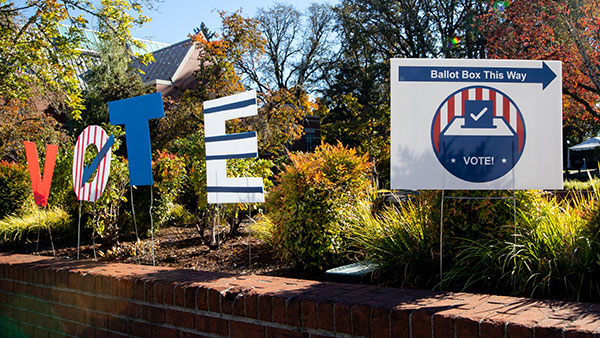McCall Center Recognized For Campus Voting Engagement Efforts
 As the 2024 election draws closer, Pacific University’s McCall Center for Civic Engagement is receiving national recognition for its efforts to get out the vote.
As the 2024 election draws closer, Pacific University’s McCall Center for Civic Engagement is receiving national recognition for its efforts to get out the vote.
The center and its Pacific Votes program recently received a gold seal from the All In Campus Democracy Challenge, recognizing voting participation by 40 to 49% of Pacific students in the 2022 midterm election. The award is based on voting rate numbers in the National Study of Learning, Voting and Engagement study conducted by Tufts University.
Earlier in Summer 2024, the center received the Highly Established Action Plan seal from All In, recognizing its efforts to develop a nonpartisan democratic voting engagement plan. Pacific was one of 192 institutions nationally to be recognized and one of just four in the Pacific Northwest.
“We’re very proud of our voting numbers at Pacific,” said Morgan Knapp, program manager of applied and experiential learning for the McCall Center. “In recent elections, Pacific students have voted at a higher rate than comparable private institutions nationwide and at a higher rate than the general voting public. I think a lot of that comes from our participation with these national programs that provide resources, which forces us to be strategic in our planning process.”
The awards are the seventh and eighth for Pacific since the university started participating in the All In program in 2017. They come as the McCall Center ramps up its efforts to make sure that Pacific students are making their voices heard at the ballot box this November at the first and only institution in Oregon to be designated as a Voter Friendly Campus.
A nonpartisan effort, Pacific Votes helps students register to vote and provides resources for students to make informed voting decisions, no matter where they live.
Kai Markle ’27, Pacific Votes student ambassador, said while registering students is important, the bigger challenge is convincing students that their vote matters. He focuses not so much on the races for president and Congress but more on local races in their hometowns, where one vote makes a big difference.
“I start by focusing on school board elections,” said Markle, a political science major from Portland. “Most of the people I talk to are fresh out of high school and went through the public school system. Realizing that they have a say in the decisions about the school that they went to resonates.
“I focus on the local. I think many people are very aware of what’s going on at a broader scale. No one is confused as to who Kamala Harris or Donald Trump are.”
The effort also includes breaking down micro-barriers that could prevent a student from voting. The Pacific Votes website provides guidance on how to register to vote in Oregon and other states, how to apply for an absentee ballot for states that do not use vote-by-mail, and a primer by Jim Moore, the center’s director of political outreach, on how to make informed voting decisions.
Knapp emphasizes that the McCall Center does not tell students how to vote. It only eases the process for them to make their vote count.
“A key fact about voting in the U.S. is that the younger you cast your first ballot, the more likely that you will continue to be an engaged voter throughout your life,” Knapp said. “It’s our goal to smooth the path so that students know that voting is part of the culture at Pacific and to make them feel like the process of voting doesn’t become burdensome.”
Pacific Votes will host several events for students leading up to and after the election. During National Voter Education Week, Oct. 7-11, ambassadors will educate students on the races and help source quality voter information. The center plans to host an election night watch party on Tuesday, Nov. 5, along with a postmortem session with Moore in the week following the election.
The initiative also includes the Pacific Votes Pledge, which allows students, faculty and staff to voice their commitment to cast their ballots.
As Markle and other ambassadors help their fellow students prepare for the election, he hopes that they will realize that their voice, and their vote, make a difference now more than ever.
“There are so many people that have worked so hard to guarantee that right (to vote),” he said. “A large part of this is not only registering people but convincing them of why it is so important to vote.”


